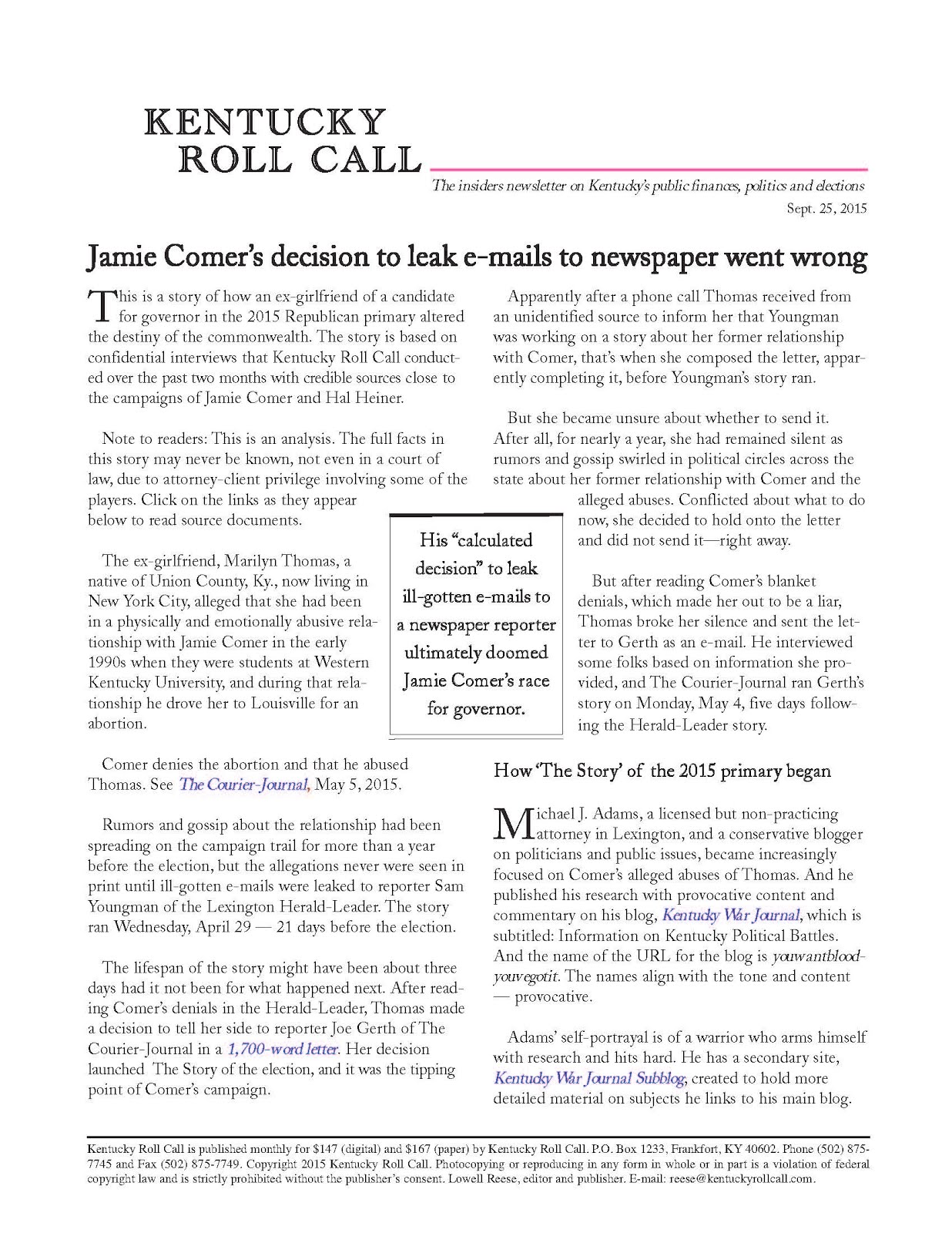February 18, 2015
Op-ed in C-J against local option sales tax
The following is an op-ed that appears today in The Courier-Journal. It is posted here to spread it in public domain without the digital ad barriers.
Proponents losing the ‘tax’ in the ‘LIFT’ effort
By Bridget Bush
Louisville attorney and founder of the Elephants in the Bluegrass blog.
As I have watched legislation for Local Option Sales Tax wind its way through the Kentucky legislature, I have grown dismayed by Republicans who have seized upon the word “local” to the exclusion of the word “tax.”
The Local Option Sales Tax would allow cities and counties to place special projects on the ballot for which voters could raise the sales tax an extra 1 percent until the project is paid off. This requires an amendment to the Kentucky Constitution. Both houses of the legislature must pass it by two-thirds, as the House has, followed by a 2016 referendum.
Rather than use the acronym “LOST,” for Local Option Sales Tax, proponents call it “LIFT,” short for Local Investments for Transformation. Mysteriously, the word “tax” has vanished. Anytime a politician gives a bill an Orwellian name to disguise its true purpose (as in “Affordable Care Act”), taxpayers should hide their wallets.
This is an additional tax, plain and simple, on top of the existing 6 percent sales tax.
It might make sense as part of comprehensive tax reform, in which property or state income taxes are reduced as an offset. That is not the case. Indeed, implementation of LIFT may make tax reform less likely. When Louisville needs money from Frankfort, say to build a bridge or pave state roads, LIFT gives Frankfort pols an out; they can respond, “if Louisville thinks the project is so important, increase your sales tax.”
Louisville already sends far more money to Frankfort than we receive back here. LIFT could exacerbate that.
LIFT is touted as a way to build transformational projects — really cool things for which the state or federal government won’t pay (and that arguably aren’t the business of government). Despite those well-meaning and ambitious intentions, LIFT could instead be used to fund the most mundane things that we expect covered by our income and property taxes — particularly if Frankfort gives us no choice. For example, cities, like Lincoln, Neb., seek LOST taxes for mundane projects like street and sidewalk repair. So much for transformational.
LIFT is promoted as adding just 1 penny on the dollar; we’ll hardly notice it. That supposed virtue is actually the problem. Any mechanism that makes it easier and less noticeable for the government to tax us ultimately will lead to more and higher taxes. Withholding of payroll taxes demonstrates that citizens can be conditioned into paying taxes on a regular basis, including tax hikes. In any event, the fact that LIFT initially would be limited to a 1-cent increase does not ensure that it will stay at that level forever, as other states have seen.
LIFT’s biggest cheerleader, Louisville Mayor Greg Fischer, likes to point out that 37 other states allow their municipalities to hike their sales taxes for local projects. With lemming-like logic, Fischer argues that because other states and many of Louisville’s peer cities have such taxes, Louisville must follow suit or be left behind. That assumes Louisville’s shortcomings stem from a failure of government to tax us enough.
LIFT’s decentralization — another of its supposed virtues —adds complexity that will burden businesses operating in multiple Kentucky communities, as they navigate multiple and inconsistent local sales taxes. Indeed, Louisville, with its smaller cities, might have sales taxes that vary by neighborhood. Or consumers can save the sales tax by buying online. That would hurt local retailers.
Part of the seduction of LIFT is that it sunsets when the special project is paid for. Citizens in Henry County, Ga., however, have seen that when one special project ends, another is already on the ballot. It therefore becomes a permanent tax in search of a purpose.
Moreover, some states have multiple forms of local option sales taxes, often used simultaneously. Iowa, for example has “SILO” (school infrastructure local option) in addition to its local option sales tax. That is deeply concerning given the regressive nature of sales taxes: the poor feel them disproportionately. LIFT only partly addresses the regressiveness by exempting food, medicine and utilities.
The Washington Post notes that three of the Republican candidates for governor oppose LIFT. Only Will T. Scott said he supports it, albeit with this warning: “We’re spending more money in government this year than any year since you were born. They need more money for what? They got more this year than they’ve ever had and they want more?” Scott said, “So you have to be really, really careful with this. . . . There is a danger to the people.”
Republican Senate President Robert Stivers calls LIFT “democracy in its purest form.” Stivers’ premise is incorrect. Taxation does not metamorphose simply because it occurs at the local level. It is still the government taking our money. This is not “democracy in its purest form” because voters have no option to reduce taxes.
Bridget Bush is a Louisville attorney and founder of the Elephants in the Bluegrass blog.
Subscribe to:
Posts (Atom)





